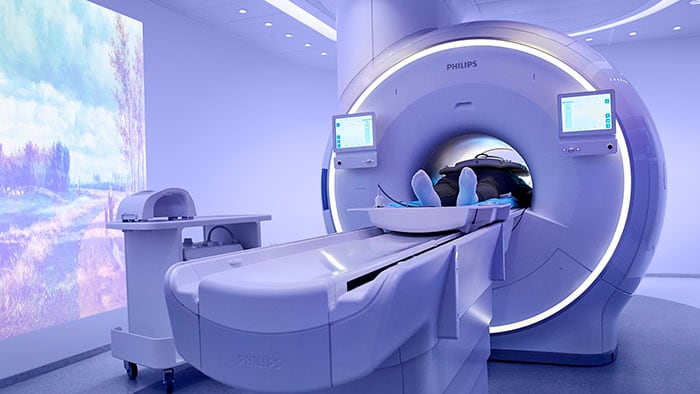
Philips introduces the first and only fully-sealed 1.5T magnet, helping to achieve ‘helium-free’ MR operations.
As early as 2018, Philips recognized this wasteful use of helium in MRI scanners was unsustainable. So the company designed an MRI magnet that not only uses a fraction of the helium than the average conventional scanner but also doesn’t vent it to the atmosphere in the event of a magnet quench. Philips’ BlueSeal Magnet is the industry’s first and still the only fully-sealed 1.5T (Tesla) magnet to be introduced in a commercially available MRI scanner. And progress has come a long way. Philips currently offers an entire family of 70cm bore scanners incorporating BlueSeal magnet technology – MR Ingenia Ambition 1.5T S, MR Ingenia Ambition 1.5T X, and the latest future-proofed, efficiency-enhancing MR 5300. With three MRI offerings that use a mere 0.5% of the helium required for conventional scanners without a refill, Philips is actively working to close the gap amid the helium shortage, making alternative, low-helium technologies more readily available across the globe.
What’s truly remarkable is that the BlueSeal Magnet in these scanners requires only 7 liters of liquid helium. The 1,700 liters of helium required for a single conventional magnet could supply more than 230 Philips BlueSeal magnets with the helium they need to produce the same quality diagnostic imaging. And these magnets never require a refill, remaining helium-free in life operations. If a field loss occurs, the BlueSeal system remains completely sealed, minimizing scanner downtime and eliminating helium sourcing problems. With a global installed base of almost 600 units, it is estimated that Philips BlueSeal-equipped scanners have already saved more than 1 million liters of helium since 2018 [7].
“We won’t have any refilling problems during the machine’s lifetime, and we can forget about the helium,” said Dr. Marίa del Mar Travieso, Head of the Radiology Department at Hospitales San Roque (Spain). “This will save us money and help us be more environmentally friendly.”
“We believe that magnets with helium-free operations will play an important role in the reliable and sustainable operations of hospitals in the future,” commented Prof Jun Hashimoto, Professor and Chairperson Department of Radiology, Tokai University School of Medicine (Japan).




